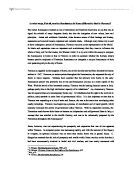The wealthy benefited more from the new public health systems than those from the lower classes, and most slaves, because the facilities were not readily available to them.
Rome had a vast empire, and had to employ a huge army to control it. Soldiers were very costly to train, they had a pension scheme, and if they died, their family would get the money anyway. So it was in the government’s best interests to keep their soldiers alive and well. They were given clean, healthy places to live, exercise, good diets and if they fell ill, they had hospitals with clean, sectioned rooms and medici (Doctors).
The Roman Empire spread over much of the known world, the soldiers built their own forts, roads and communication was the best it had ever been. Many new ideas from the outer regions of the empire were making an affect in Rome, as the Romans were more interested in taking other countries’ ideas than having their own. With such good communication, things other than information could be brought back from around the empire, such as slaves, new, strange animals, and new, strange diseases. Giving Rome yet another reason to have good public health.
Healers
When Rome conquered Greece, they brought the Greek doctors back as slaves, in Italy they were forced to treat the rich and noble Romans, they themselves being treated with disdain. Over the years, the Romans became impressed with the Greek doctors’ knowledge and in 46BC, Julius Caesar allowed these doctors to become Roman citizens.
Also, we see again the role of women in the home as basic healers, often becoming local healers in the poorer areas of the empire. The skills of women here as healers were not disputed and so, breaking from the Greek ideas, women could become doctors and midwives. This was a great step forward for the progression of medicine, but had limited affect on public health.
One great improvement that did probably affect public health was that priests were no longer really consulted upon matters of health, the general population was looking more toward practical healing than religious, creating public health, rather than trusting in their gods to keep them well.
Theories
As the first doctors in Rome were Greek, the Roman doctors to follow them thought similarly about the causes of disease, which were the 4 humours. This was important for public health because the theory of the 4 humours encouraged good personal health and hygiene. In Greece the scale of their cities didn’t really force the government to implement public health schemes. But in Rome, how could they have personal health and hygiene when they were surrounded by filth? Cleanliness was introduced, with a great effect in cutting down disease.
Technology
Because of their great skill in construction, the Romans could build advanced stone structures such as Aqueducts, sewers and public baths. Some of these are still in good condition today, for example, Roman sewers in York that are still in use, and the Roman baths in Bath. Fine metal working abilities enabled a wide range of surgical instruments to be made.
Treatments
Some Roman doctors, like Galen, were not satisfied with just doing what those before him had done. He accepted Hippocrates’ ideas of the 4 humours, and treating a patient by reducing the humour they had too much of. But he also came up with the idea of opposites to treat someone. For instance, if you had the flu, then you had too much phlegm which was linked with the cold. He would prescribe you something hot like a pepper to balance it out. Galen’s study of surgery and anatomy together with improved surgical instruments, allowed surgery to be more effective. Life expectancy of soldiers and those who could afford it increased.
Key figures
Galen was born at Pergamumin AD 129. In AD 144 Galen studied medicine with the physicians at the sanctuary of Asclepius. When he was 19, his father, Nicon died and Galen travelled to further his education at Smyrna (modern Izmir), Corinth and Alexandria where he was able to dissect human bodies. In 157 he returned home to a position as a physician to the gladiators where he spent 4 years gaining valuable practical experience. At 32, Galen left Pergamumin and moved to Rome. By AD 168, Galen was well known enough for the emperor Marcus Aurelius asked for him as his personal physician. At one point, he saved the life of Marcus’ son, Commodus. Galen spent the rest of his life in Rome, lecturing, writing books and treating his wealthy patients. He wrote many books (60 of them), in which he detailed his new theories and treatments, such as the use of opposites. And although many of his texts were lost in a fire, AD 191 at the Temple of Peace, there were still enough to cover most of his theories and to show his character. As a fiery man, passionate for medicine and philosophy and contemptuous of other doctors for their ignorance and greed.
He died in Rome, just after AD 210.
Galen’s ideas on health, observation of illness and surgery were highly influential with the Emperor (Himself a philosopher). As the emperor believed he had a duty to look after his people, Galen indirectly influenced the public health measures, through Emperor Marcus Aurelius.
Conclusion
The Roman age was a period of vast progress in public health. They began with similar ideas and technology to the Ancient Greeks, and developed systems of clean water, sanitation, and hygiene that are still in use today. As a result of this progress, the general health of the Roman people improved, but more so for the army and the rich. The theories and methods of those such as Galen dominated medical practice for over 1500 years.







